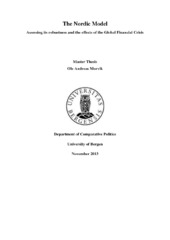The Nordic Model: Assessing its robustness and the effects of the global financial crisis
Master thesis
Permanent lenke
https://hdl.handle.net/1956/7677Utgivelsesdato
2013-11-20Metadata
Vis full innførselSamlinger
Sammendrag
It is sometimes said the Nordic countries of Denmark, Finland, Norway and Sweden have found a magic way of combining high taxes and lavish welfare systems with fast growth and unemployment. Some credit this to the triumph of social democracy, others to open markets and free trade tempered by a comprehensive security net. And many have in the past, and still do, predicted the end of the Nordic Model because there is no such thing as magic, and even the Nordic countries must sooner or later face the world's harsh realities. The goal of this thesis is to investigate the traits of the Nordic Model and assess its robustness in the face of the Global Financial crisis and the years to come. To achieve this end, a Nordic Model is constructed based on the earlier work of Erling Barth, Kalle Moene and Michael Wallerstein that finds centralised wage setting processes and the resulting wage compression to form an institutional equilibrium that is at the base of the Nordic Model. This study finds that with a possible exception of Denmark, the institutional equilibrium is still robust in the Nordic countries, and has not been affected by the Global Financial crisis. The findings also call the exact nature of the hypothesised relationship between centralised wage setting processes and wage compression into question.
